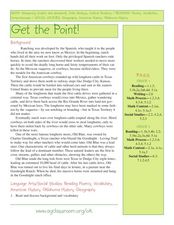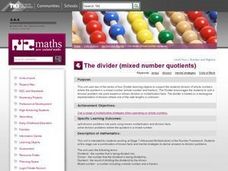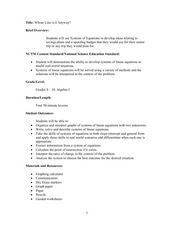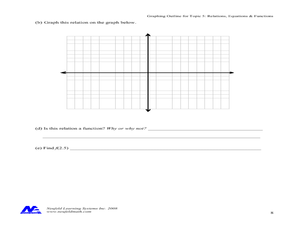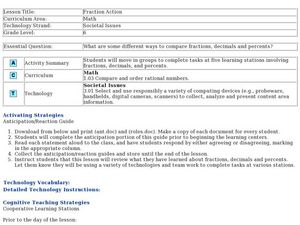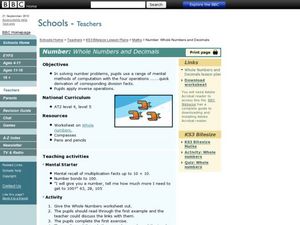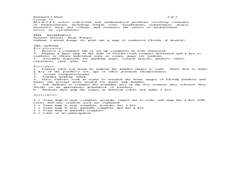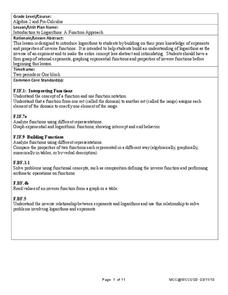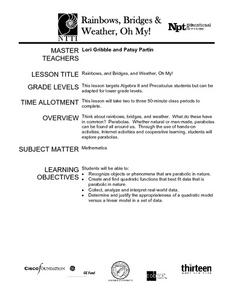Curated OER
Decode Word Is..
Students solve problems using patterns. In this algebra lesson, students identify the relation, domain and range of a function. They graph functions using coordinate pairs.
Curated OER
Getting The Point
Young scholars complete a unit of lessons on the relationships between decimals, whole numbers, and fractions. They use paper strips to solve fraction problems, view and solve examples, and use calculators to convert fractions into...
Curated OER
The divider (mixed number quotients)
his unit uses two of the series of four Divider learning objects to support the students division of whole numbers where the quotient is a mixed number (whole number and fraction). The Divider encourages the students to split a division...
Curated OER
Whose Line is it Anyway?
Learners solve systems of equations. In this algebra lesson, students identify the domain and range of each function. They use the slope and y-intercept to graph each line.
Curated OER
The Trig To Soccer
Students are given the background information to open the lesson: Suppose a penalty kicker in soccer could choose where he could kick from, as long as he stayed on the back line of the penalty area. Would he have a better chance of...
Curated OER
Relations, Functions and Equations Worksheet with a Computer Component
For this relations worksheet students solve eighteen problems related to relations, functions, and equations. The first part of this worksheet is designer to be completed with a computer program.
Curated OER
Fraction Action
Young scholars solve problems with fractions. In this algebra lesson, students review the names of fraction and equivalent fractions. They review multiplication and how to find the inverse of a division problem.
Curated OER
Use or Make a Table
For this make a table worksheet, students read real world questions and write an equation to match the equation. Next, they solve the equation. This one-page worksheet contains two problems.
Curated OER
Counting on Counting
Students recognize that counting tells how many objects are in the set irrespective of how they are arranged or the order in which they are counted. They solve problems involving one more or less to a given set using their knowledge of...
Curated OER
Number: Whole Numbers and Decimals
Young scholars explore whole numbers and decimals. In this decimal lesson, students discover how to perform multiplication with decimals as they complete a worksheet.
Curated OER
The Box Problem
Students investigate the concept of functions and how they are used with polynomials. They practice finding the zeros of functions and graph polynomial functions for the help of giving solutions. Students interpret the curve of a line...
Curated OER
How Many? Counting to 8
In this counting to 8 worksheet, young scholars solve five problems in which objects are counted. Students circle the number that tells how many; the range here is from 1 to 8.
Curated OER
Home on the Range
Students use maps and mathematics to determine the appropriate panther population in a given area. In this Florida ecology lesson, students research the area requirements of male and female panther and use a map to help calculate how...
Curated OER
Mammoth Sunflower Problem
Students discuss the directions on a package of seeds. They open the package, count the seeds, and determine the planting requirements for the seeds.
Curated OER
Paying for Crime
Students participate in activties examining ratios and proportions. They use graphs to interpret data showing the government's budget for prisons. They present what they have learned to the class.
Mathematics Assessment Project
Evaluating Statements About Enlargements
Double, toil ,and double linear dimensions. Learners first complete an assessment investigating how doubling linear dimensions affects the area of pizzas and the volume of popcorn containers. They then complete an activity investigating...
Curated OER
In the Billions and Exponential Modeling
Modeling population growth gives learners an opportunity to experiment with real data. Comparing the growth rates in this real-life task strengthens learners' understanding that exponential functions change by equal factors over equal...
West Contra Costa Unified School District
Introduction to Logarithms
Build on pupils' understanding of inverse functions by connecting logarithmic functions to exponential functions. This activity allows individuals to see graphically the inverse relationship between an exponential and logarithmic...
Illustrative Mathematics
The Escalator, Assessment Variation
A great way to practice with unit rates, the activity gives your mathematicians an opportunity to compare different statements and select which are true. They can practice with "choose all that apply" by setting each statement into its...
Illustrative Mathematics
Riding at a Constant Speed, Assessment Variation
Practice ratios and unit rates with tracking how long Lin took to ride her bike. Provided with different questions, your mathematicians can assemble their answers using a chart or setting up ratios. The activity is included in a set of...
Illustrative Mathematics
Molly's Run, Assessment Variation
Part of as assessment series, the activity follows the lesson Molly's Run to practice ratios and dividing with fractions. Different solution options are given for your learners' preference. The commentary explains how the...
Curated OER
Rainbows, Bridges & Weather, Oh My!
Explore how real-world applications can be parabolic in nature and how to find quadratic functions that best fit data. A number of different examples of modeling parabolas are explored including a student scavenger hunt, the exploration...
Hawaiʻi State Department of Education
ABA Form in Music
Patterns happen everywhere, in music, math, and language! Fourth graders listen to the "William Tell Overture" visualizing the patterns that they hear. They then discuss and write an ABA poem that matches the ABA form found in the music...
Curated OER
Doing The School Run
Learners explore finding the percent of a numbers. They survey their peers to determine modes of transportation used in getting to school. Afterward, students organize information and create graphs and charts. They explore alternative...



